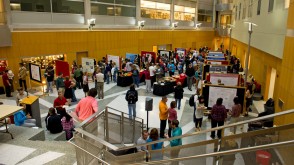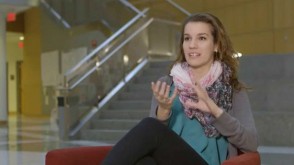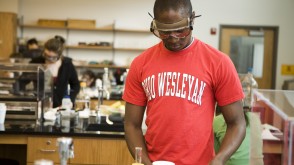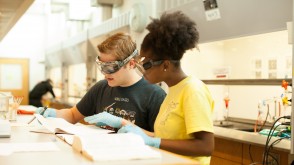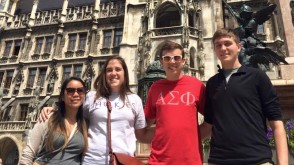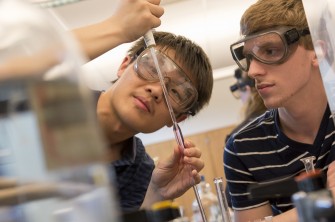
Teaching & Research Labs
The department features seven modern laboratories for classroom research and four dedicated labs for use in independent research with faculty. The facilities are designed to expedite workflow and promote collaboration.


Biochemistry is the study of the chemistry of living systems. Biochemists use of principles of general chemistry, organic chemistry, inorganic chemistry, analytical chemistry, and physical chemistry to understand biological systems. We study the structures of the various classes of biomolecules, how their activity is affected by their structures, and how they interact with one another in an incredibly complex and dynamic array of metabolic processes that transfer, store, and release energy to meet the needs of the organism.
Ohio Wesleyan offers two distinct majors in chemistry to meet the educational and career goals of students.
All Biochemistry majors have opportunities to conduct independent research under the guidance of a faculty member.
Biochemistry majors conduct research in areas as diverse as computer modeling, synthesis and analysis of inorganic complexes, design and testing of probes for environmental analysis, synthesis of complex organic molecules, and chemical modification of proteins.
OWU provides several ways for you to combine academics and travel across the country and around the world. In Travel-Learning Courses, you one or two weeks of travel is built into a class, adding depth and context.
You can also participate in research at other universities, internships across the country, or special projects that you design yourself to complete anywhere in the world.
Build your experience and connections to the professional world with internships at universities, research centers, hospitals, and other organizations.
You also can received University-funded Theory-to-Practice Grants for research projects that you design.

The department features seven modern laboratories for classroom research and four dedicated labs for use in independent research with faculty. The facilities are designed to expedite workflow and promote collaboration.
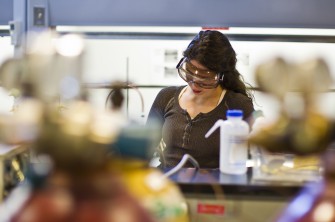
The Ohio Wesleyan Women in Science Organization is a collection of students who share a passion for mathematics and the natural and social sciences. They share information about research opportunities, graduate school positions, and summer internships; promote discussion of issues facing women in science; bring in guest lecturers; arrange field trips; and participate in community service.
Infrared (IR) spectroscopy exposes samples to a broad band of infrared radiation. OWU has three IR spectrometers: a Thermo-Nicolet Nexus 670 FT-IR, a Thermo-Niclolet Avatar 360 FT-IR, and a Nicolet 210 FT-IR.
Ultraviolet/visible (UV/Vis) spectroscopy measures the light absorptions by molecules due to electronic excitations in the ultraviolet and visible regions of the electromagnetic spectrum. OWU has three HP8453 UV/Vis spectrometers, one of which is equipped with an HP 89090A temperature control module.
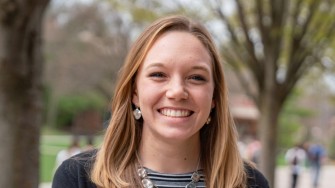
After graduating, Madeleine was accepted into the Ohio University College of Osteopathic Medicine. While at OWU, Madeleine participated in a Travel-Learning Course comparing the national health care systems in the U.S. and Europe and conducted summer research on songbirds and on biochemistry.
Recent graduates have moved straight from OWU to science careers at Battelle Memorial Institute, Boehringer Ingelheim, the Clean Air Council, M.D. Anderson Cancer Center, Monsanto, and other leading corporations and organizations.
Recent OWU graduates are enrolled in medical school at Boston University, Johns Hopkins, Michigan, Northwestern, Ohio State, and many other top programs.
Biochemistry major Evan Bai graduated from OWU in 2011 and moved on to graduate school at Yale. In December 2015, his research on how benign brain tumors become malignant was published in "Nature Genetics," the most prestigious research journal in genetics. After graduating from Yale, he became a research scientist in computational genomics at Vertex Pharmaceuticals in Boston.
After graduating from OWU in biochemistry and physics in 2016, Alexandra Cook worked for a year in a research program at the Mayo Clinic, earned an M.S. in chemical engineering at Columbia, then was hired as a senior research engineer at Celgene in New York City. As an undergraduate at OWU, she completed a research internship at the Mayo Clinic and volunteered at a Delaware food pantry.
